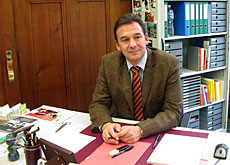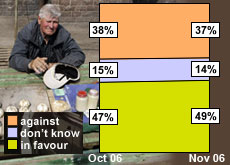Eastern Europe funds put to the test at polls

Voters will have the final say on Sunday over a SFr1 billion ($800 million) payment to the ten new European Union member states and extending aid to eastern Europe.
In a separate ballot, the Swiss will decide on a parliamentary proposal for a unified minimum child allowance.
The SFr1 billion is slated for a series of projects on the environment, infrastructure and education over the next ten years in a bid to close the gap between rich and poor regions in the new member states.
The Swiss government pledged to contribute the sum during negotiations on a package of bilateral treaties with the EU in 2004.
“Switzerland is able to contribute to a stable Europe from which it could benefit in many respects in return,” said Foreign Minister Micheline Calmy-Rey.
Parliament has endorsed the decision, with three of the four main parties coming out in favour.
“Our credibility on the international stage is at stake,” Pierre Kohler, from the centre-right Christian Democratic Party, told swissinfo.
Anti-EU
But the rightwing Swiss People’s Party, which is known for its anti-EU stance, has forced a nationwide vote. It says the payment could prompt further financial demands and should be offset by cuts in development aid.
“The payments amount to blackmail, because other EU countries will ask for money too,” said People’s Party parliamentarian Ulrich Schlüer.
Switzerland is not a member of the EU, but the EU is its main trading partner. A series of bilateral accords has been concluded with the EU and efforts are underway to negotiate further agreements.
The SFr1 billion contribution is part of Switzerland’s eastern Europe aid programme, which has been active since the 1990s. Parliament has agreed to renew the law, which provides the legal basis for the payment.
Unified benefits
Voters will also decide on a unified minimum child allowance that has been agreed by parliament but challenged by the business community with the backing of the People’s Party and the centre-right Radical Party.
Under the proposal parents will receive a SFr200 monthly benefit per child and SFr250 per child aged over 16. Currently the sum varies from canton to canton.
Supporters say the move is a step towards more family-friendly policies and makes the current system more transparent.
“Having children today means a risk of falling into poverty,” says parliamentarian and trade unionist Hugo Fasel.
Opponents argue the new scheme is too expensive and undermines the autonomy of the country’s 26 cantons. Most of the extra costs, estimated at just under SFr600 million a year, would have to be paid by employers.
“In the end this will lead to higher costs for salaries,” warns Pierre Triponez, parliamentarian for the Radical Party and president of the Association of Small and Medium-sized Enterprises (SMEs).
The vote marks the latest stage in a 30-year effort to standardise benefits. Last year trade unions withdrew their proposal for a SFr450 monthly benefit, paving the way for a compromise in parliament.
swissinfo, Urs Geiser
This is the third nationwide ballot on EU integration since 2005. In that year voters approved a bilateral deal on security and asylum cooperation with Brussels and also came out in favour of extending the bilateral treaties to the ten new EU member states.
Switzerland is not a member of the EU, but it has concluded 16 bilateral accords, including on trade, labour, taxation, asylum, transport and research.
Moves are underway to negotiate a free-trade agreement between Switzerland and the EU, as well as a deal on electricity.
Since the 1990s Switzerland has spent SFr3.5 billion on some 1,000 projects in eastern Europe.
The proposed SFr1 billion payment is to go to the ten new EU member states, notably Poland and Hungary.

In compliance with the JTI standards
More: SWI swissinfo.ch certified by the Journalism Trust Initiative














You can find an overview of ongoing debates with our journalists here . Please join us!
If you want to start a conversation about a topic raised in this article or want to report factual errors, email us at english@swissinfo.ch.